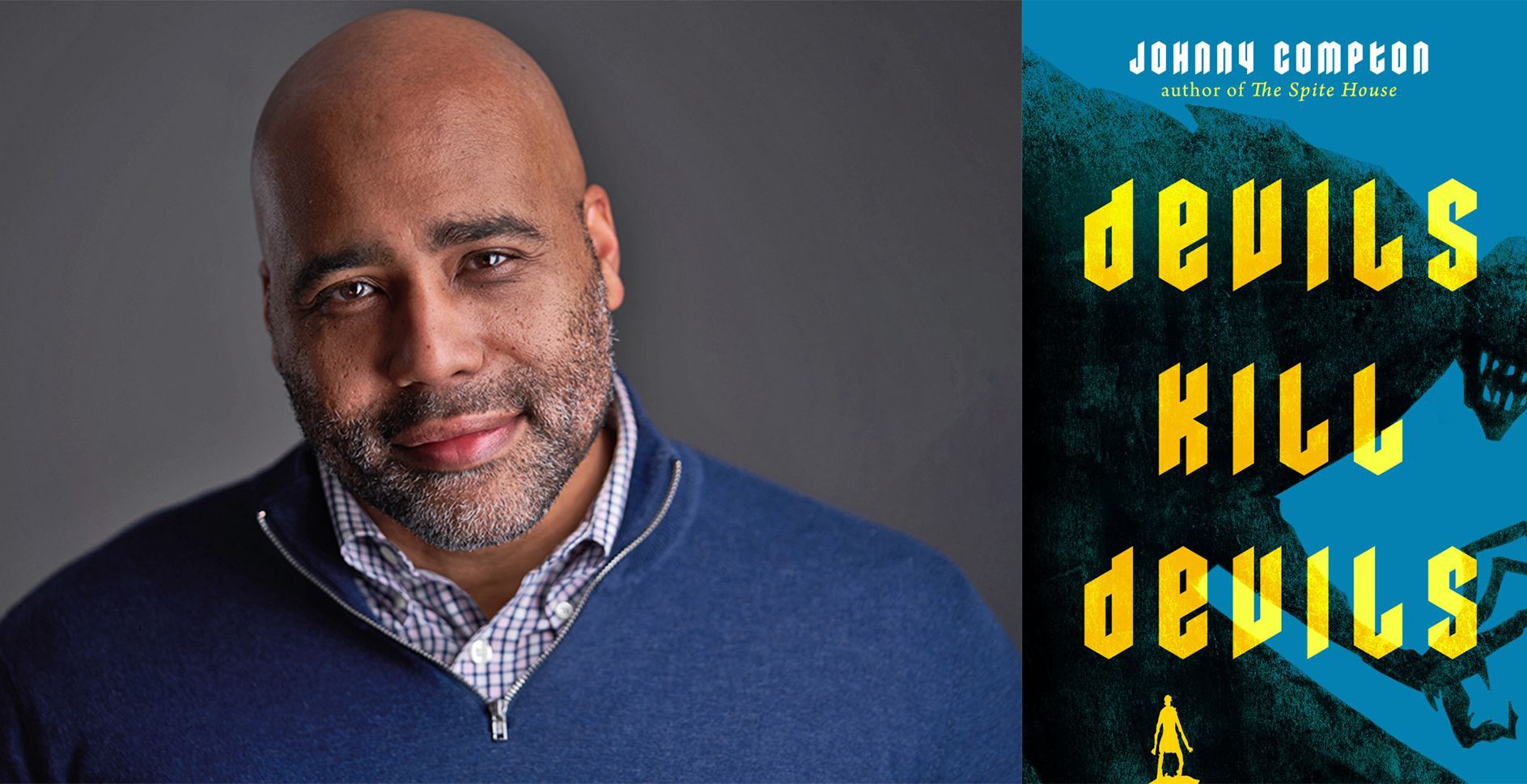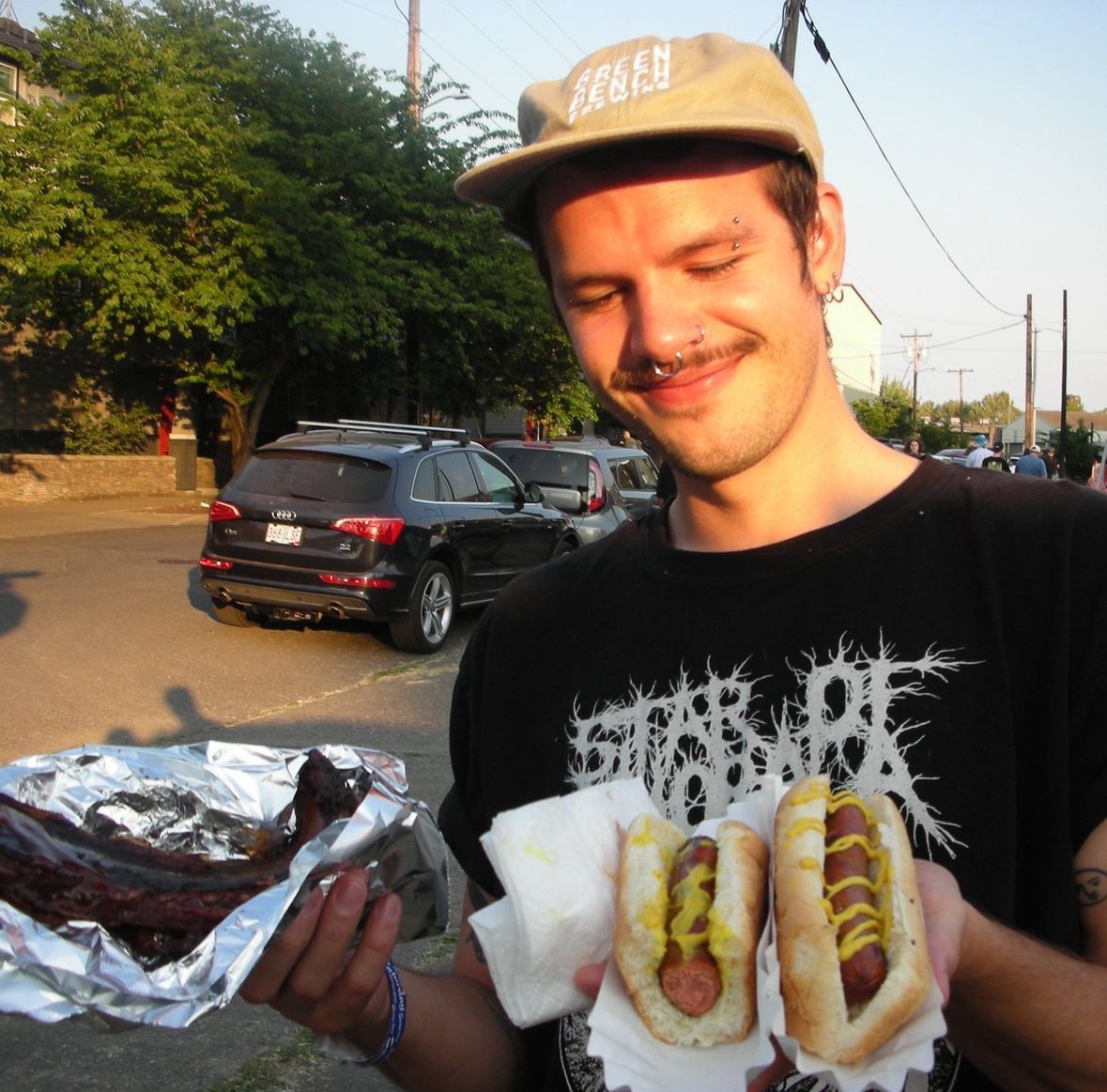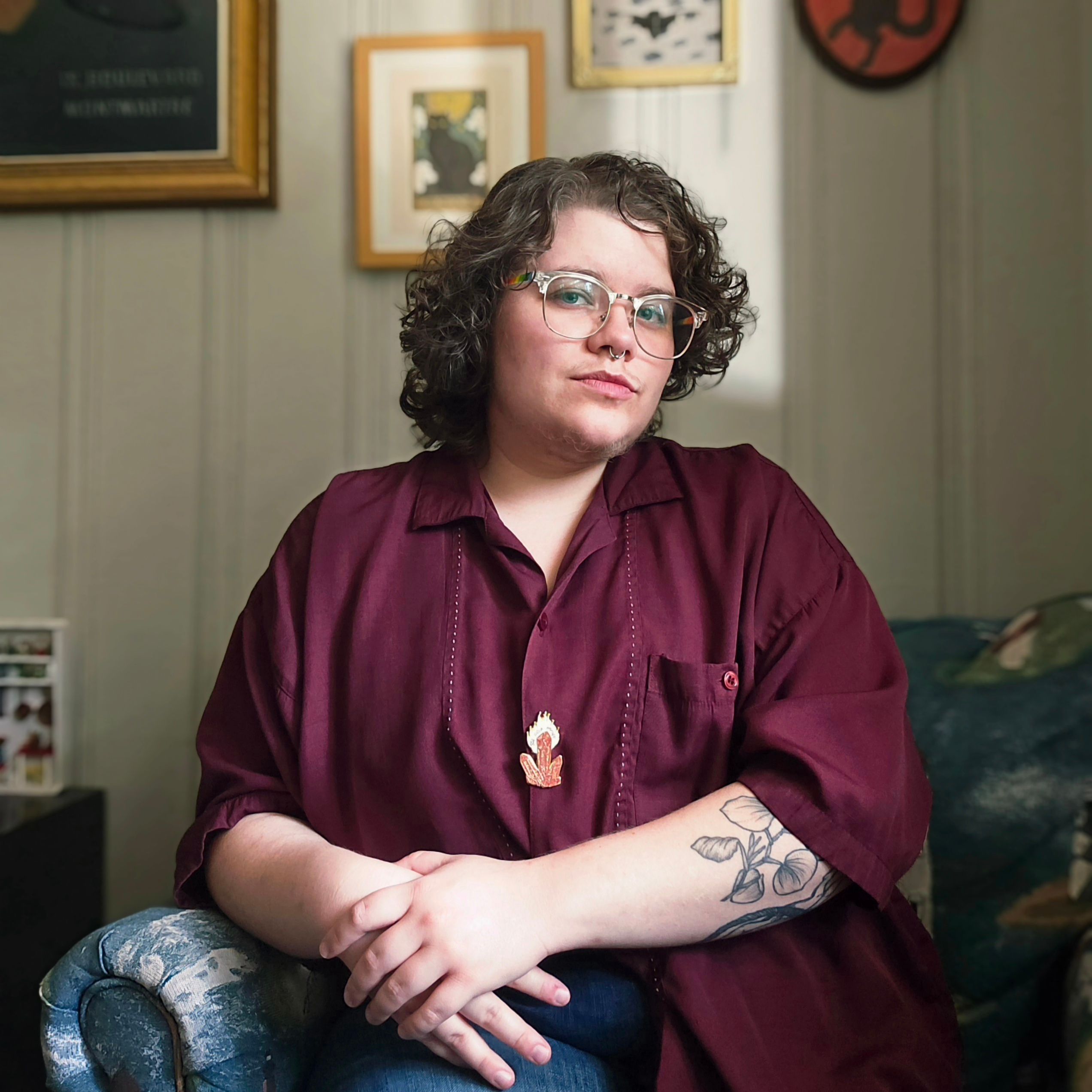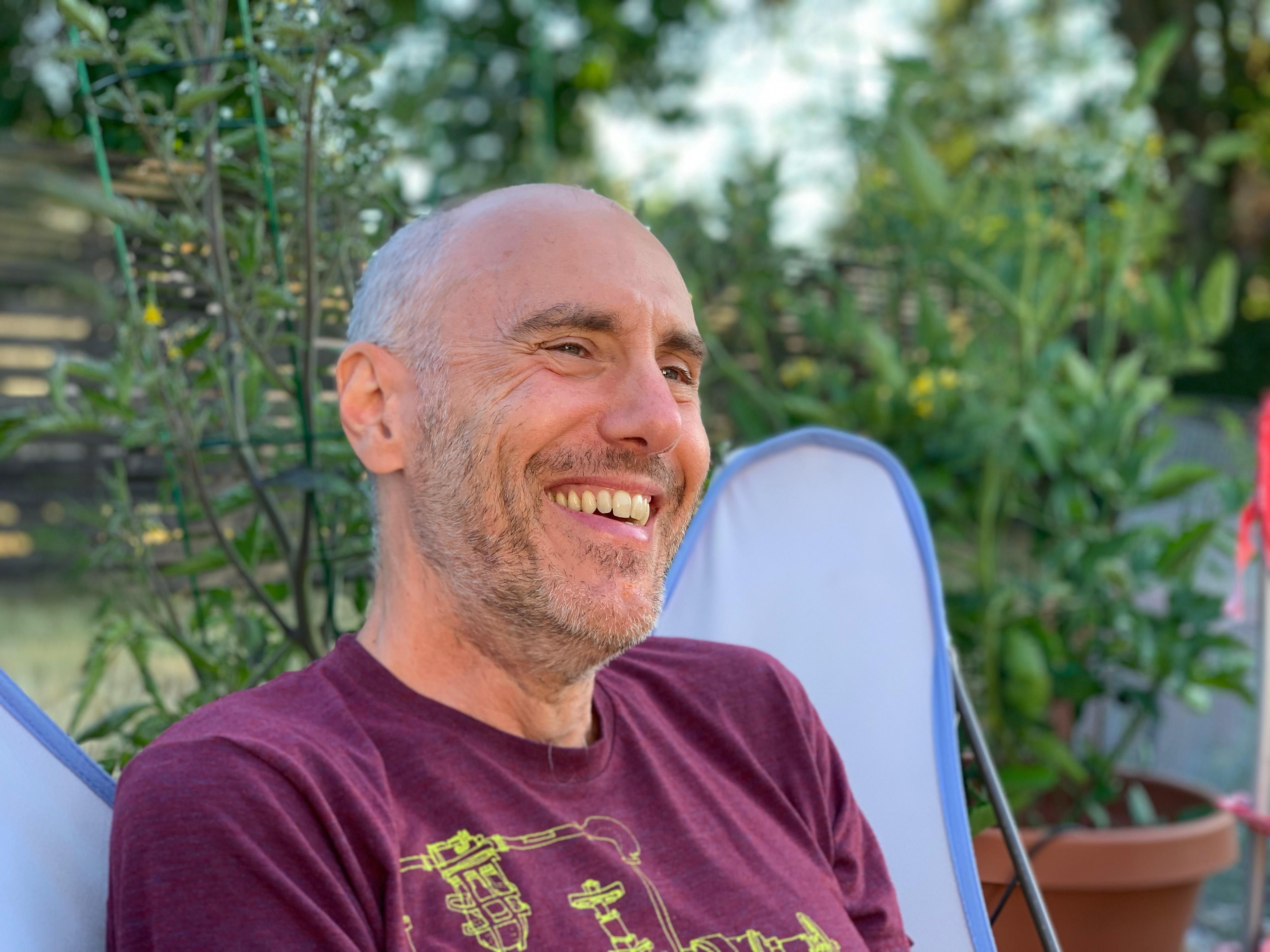Aaron Courts: What a follow up, Johnny. I read your debut novel recently, then rolled directly into your latest. Were there any lessons learned writing The Spite House you think helped in the process of writing Devils Kill Devils?
Johnny Compton: Yeah, there were a ton. One of the big ones I learned was just to let the editor do their job. By which I mean, don't self-reject. I have scenes in Devils Kill Devils that made me pause for a moment, just in terms of is-this-going-too-far, because The Spite House is such a different book and Devils Kill Devils is so much more intense and violent. And there’s just a lot going on plot-wise as well, but I loved these ideas. I realized my editor is there to let me know if something's a little too far, and she did with a couple. Not really any of the intense moments. In fact, she asked me to add one more massacre than I already had. I'd written three massacre scenes, and she was like, “Do we have one more?”
If you feel like it's a good idea, don’t hinder yourself before the editor even gets a chance to read it, and possibly reaffirm it or reject it one way or the other.
AC: I’ve heard you talk about growing up in a Protestant house while having a Catholic education for a period in youth. Are their specific aspects of either that got your attention as a child and stand out as significant influences on Devils Kill Devils now?
JC: Yeah. Catholicism definitely stands out more. I was raised, like you said, Protestant, and I had that in my life more directly and for a longer period of time. I remember being in a youth group with my Protestant youth leader. He was the first person to point out to me what is kind of obvious, but I didn’t even notice. That in Protestant churches the cross is usually just the cross itself, and in Catholic churches Jesus is on the cross. It shows the difference between emphasizing the resurrection versus the sacrifice.
I think there is something more compelling visually, obviously, about going into a church and being like, “Here’s the son of our god. Here’s what we did to him. Don’t ever forget it. Don’t ever forget that we killed the Son of God,” and that is the image you have to see. That influences the book as far as the lead villain and her attempts to utilize religion in a way to destroy and remake the world as she sees fit.
AC: You know I’m a Marine, so I love it when there are military-crumbs in a story. In Devils Kill Devils, there are, among others, references to the military with an active-duty member of the Coast Guard and metaphors and analogies for war. What is it about your connection to the U.S. military that encourages you to use these elements in your writing and this story?
JC: I see it as a way to make sure that my writing is kind of uniquely mine. Being a military-brat with a military family, and then living in a military town like San Antonio… yeah, it just kind of makes sense for it to show up in some fashion or another. It’s a way to help distinguish, hopefully, my writing in a positive way.
AC: So, when you’re describing something in a way that’s military-adjacent, do you think “I’m going to use this description to make myself more distinctive?” Is it that intentional, or is it more organic and just how you think about things and then describe them?
JC: I think it’s a little bit embedded in me. I love my dad, but you know, he’s one of those cats. We could be watching anything, and if there’s any kind of military element in it, he’s the one who’s like, “They wouldn’t do that. This wouldn’t happen.”
So, with that in mind, I think it’s one of those things where it’s kind of in my brain, like A. I can bring this up, but then B. If I’m going to do it, I need to make sure I do it pretty well. Because, you know, he might pick it up and read it one day. Horror is not really his thing, but he’s thrilled for me, that I’m having the success, and I’m sure there’s a potential for him to pick up a book one day. And I’m waiting for him…
He’ll be like, “Hey, I really love this, but page 101…”
AC: “The casualty radius for fragmentation of a concussion grenade is off.”
JC: Exactly. I think it just kind of seeped into my brain.
AC: I get it. Speaking of seepage, Texas is all over your stories, and your response might be similar, but I’ve gotta ask. What is about Texas that really speaks to you?
JC: Well, I’ve been in Texas since ’94. I was born in Texas, and I think when I was three months old, we moved to Hawaii. Again, Air Force kid. I spent my childhood in Hawaii and then Mississippi. And then the Texas thing, you know, it’s huge.
You have the hill country, veritable swampland, greener areas than you might expect Texas to be and then, obviously, West Texas, which is what I think most people think of when they think of Texas— more of a desert. Skull of a cow, you know? Desolate wasteland. And you have some of that, but you have all these other places, and you have a lot of different stories, and you have a whole, huge range of history and this clash of cultures. Between Mexico— what was formerly Mexico— and all the different people who’ve immigrated here. And the way history in Texas has been altered and changed because of weather.
It’s just a hug sandbox to play in. And I’ve been to other places. I’ve been fortunate enough to travel, and there’s a lot of gorgeous, wonderful parts of the country. But I don’t know if there’s as much variety in some of these other parts of the country as there is in a place like Texas. It’s sort of like New York if it were spread across this vast landscape.
There are all these crazy, cool things here, and we’ve got, if you’re writing horror, a lot of messed up stuff too. Historically and in the present that we can draw from. And that helps, frankly. There’s something about utilizing spaces where there’s this clash of beauty and ugliness and glory and shame, and if you can merge these things together, there’s a lot of potential from that volatility and contrast. Texas has it in abundance, and it’s great to explore that.
AC: You touch on history, and it’s obvious a lot of research went into this novel. Your author’s note was great, by the way. It offers a glimpse at just how much research you conducted, but was there anything you came across that really surprised you whether it made it into the book or not?
JC: The big thing which made it into the book was that I didn’t see any clear indication vampires, or werewolves, or versions of ghouls or zombies— all the things that feed on blood or flesh— could starve to death. That becomes one of the motivating factors of my primary villain. What happens if humans accidentally destroy themselves? And what happens to the immortal beings that can be killed in a lot of different ways but can’t starve to death?
AC: You layer mythology, theology, and cosmology— a lot of -ologies— into Devils Kill Devils. Do you think this story leans on one of the disciplines more than any other?
JC: The cosmology of it. I think it’s an underlying, fascinating thing right down to the last line of the book. It’s starting from this idea of what is, or isn’t, an angel. This is where I realize how much of an anime and manga nerd I’ve always been. Because it is like these weird anime stories that are about gods and gods from space and ancient gods. And so, I feel like a lot of stories I read growing up had this element to it where we’re starting off on an intimate scale, and then we blow it up to this cosmology, and yet somehow bring it back around to something that feels intimate.
AC: Near-death experiences are an essential component of the story. I’m curious why near-death, out of all the other human experiences, have such a role in the story?
JC: I think I'm just kind of drawing on some personal experience. I don't feel like I've lived that interesting of a life, but I have had those moments, a handful of occasions, whether it's from illness or misadventure. These are the things Sarita goes through. Finding out you were almost going to be wiped out from existence, and barely dodging that. If that doesn’t motivate you, I don’t know what the hell will.
AC: Do you think near-death experiences create a tangible pathway for the supernatural?
JC: I'm basically agnostic these days. I have that logical side of me that's like, the world is as it is. Science, etc. And then I've had my own experiences with things that maybe I'm in denial about that. But when I tell people who are believers, they're like, “Dude. You saw a ghost,” and “You had a psychic experience,” and all this other stuff. So, I'm like, “Okay, well?” And then when I try and talk myself out of it, I still feel like I’m not convincing myself, like I’m making excuses for why I didn’t see a ghost, and it should be the other way around.
I’ve heard stories from people that leave me very open to the concept that a near-death experience can bring you closer to the supernatural. Again, I’m kind of a half-believer, or just a person who says you can’t really know, as an agnostic, but it is a distinct possibility.
AC: Okay, I think after reading this, vampires are one of your favorite monsters. Is that true, or was this just, “I haven’t written my vampire story yet, so I’m gonna do it.”
JC: I mean, both, but also vampires have been my favorite for a long time. Like a long, long time.
AC: They seem to cover almost all the bases for a lot of the supernatural things out there. Did you ever consider keeping their role in this world more limited, or was it another way to differentiate the story from others? A way to say, “Hey, this story is more real than you guys think because vampires could actually be the answer to all of these phenomena.”
JC: I love this question so much. It was basically inspired by reading some old school texts. I realized that in a lot of these they basically considered vampirism could be this kind of centerpiece or this epicenter of where so many evils maybe stem from. And so, making the vampires like that was an opportunity for a jump off point. That was fun and fascinating.
AC: Let me ask you about the pace of your work and the relationship you have with readers. You described this story as “tight,” which I think is perfect. It’s a great holiday weekend-length read and perfect for a long flight, and yet, it’s brimming with complex characters, plot moves, and layers and layers of some of the things we spoke about earlier, all the -ologies. The Spite House is similar in so many ways. How do you manage to fit these expansive stories into such, as you say, tight narratives?
JC: I think it's a style that I've developed deliberately. I’m wordy and that translates to my writing. I recognized that ages ago, and I needed to tighten up my writing. And so, I started reading Hemmingway and Walter Mosely. I love Elmore Leonard. Then it became, “how do I keep things propulsive and keep the plot moving and develop characters along the way?” And so, I'm trying to give you either strictly what you need to know, or what is hopefully, a really awesome, compelling idea, and something propulsive and keeping the action flowing. And I think that's just the style I developed, because I'm aware that I will definitely blow up the story into a much longer tale.
AC: I think it’s clear that you write with faith in the reader.
JC: That’s exactly the way I put it. Have faith in your reader. Have faith in your audience. And so, yeah, I have a lot of faith in my readers, and hopefully that faith is rewarded. Either way, this is kind of my style, and it’s worked out for me.
AC: I mentioned the complex characters, and this story is chalked full of them. One of the things I found unique about Devils Kill Devils was how many names some of these characters have. Why did you choose to introduce so many names for the same characters?
JC: The primary reason is that I was writing a story about mythology and religion, and in both you have the same entities and individuals, oftentimes, having multiple names. I felt like that was going to help flesh out elements of the world and give the characters variety. And so, you get into the legends of what these people are. It’s the religious and mythological aspect of it.
AC: Let’s end on a fun note. What is your favorite character name?
JC: I really like the God Maker. Did you have a favorite?
AC: Oh, for sure. It was my favorite character too. The Northman.









